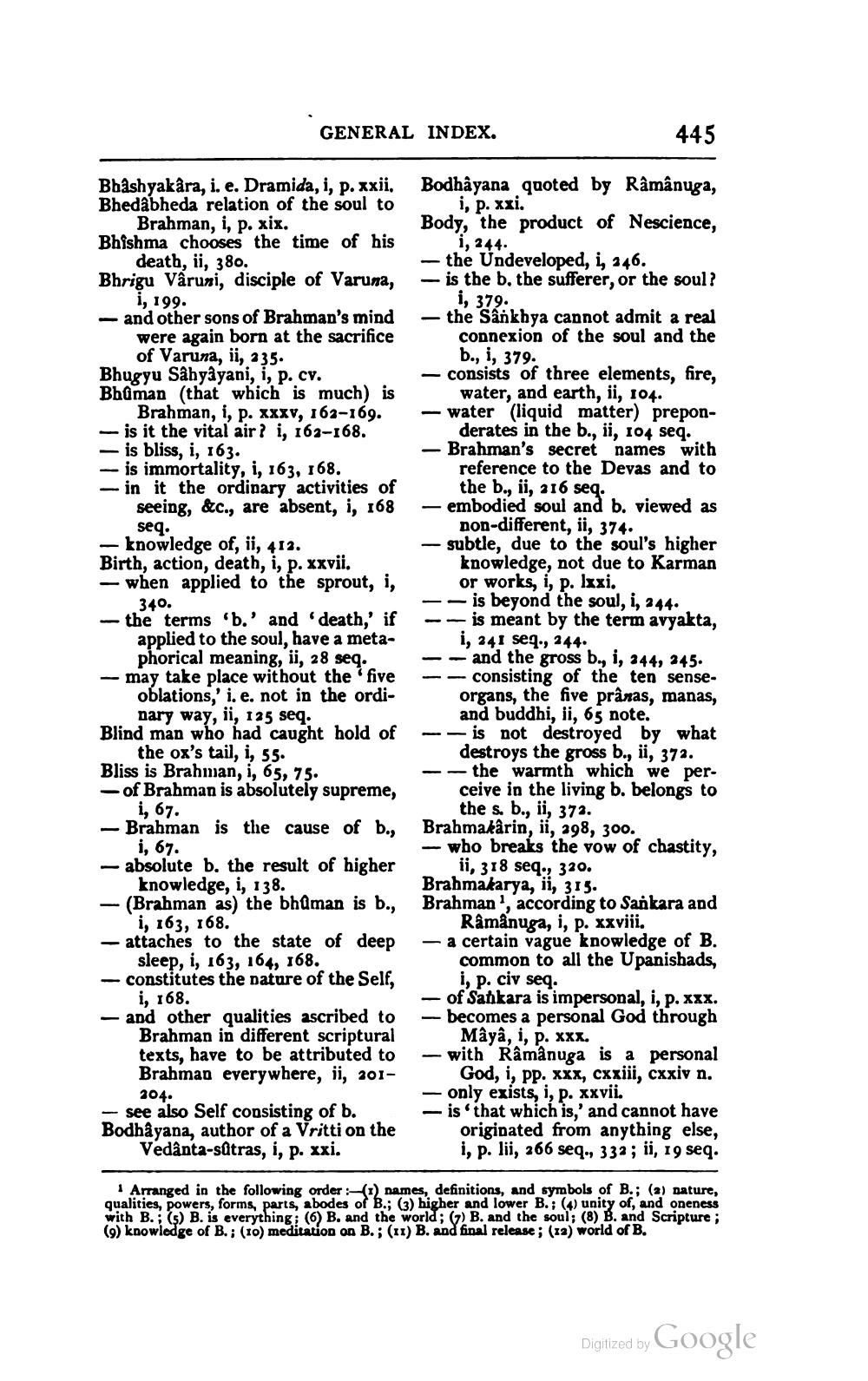________________
GENERAL INDEX.
445
Bhashyakâra, i. e. Dramida, i, p. xxii. Bhedabheda relation of the soul to
Brahman, i, p. xix. Bhishma chooses the time of his
death, ii, 380. Bhrigu Vâruni, disciple of Varuna,
i, 199. and other sons of Brahman's mind were again born at the sacrifice
of Varuna, ii, 235. Bhugyu Sahyayani, i, p.cv. Bhuman (that which is much) is
Brahman, i, p. xxxv, 162-169. is it the vital air? i, 162–168. - is bliss, i, 163.
is immortality, i, 163, 168. in it the ordinary activities of seeing, &c., are absent, i, 168
seq. - knowledge of, ii, 412. Birth, action, death, i, p. xxvii. - when applied to the sprout, i,
340. - the terms 'b.' and 'death,' if
applied to the soul, have a meta
phorical meaning, ii, 28 seq. - may take place without the five
oblations,' i.e. not in the ordi
nary way, ii, 125 seq. Blind man who had caught hold of
the ox's tail, i, 55. Bliss is Brahman, i, 65, 75. - of Brahman is absolutely supreme,
i, 67. - Brahman is the cause of b.,
i, 67. - absolute b. the result of higher
knowledge, i, 138. - (Brahman as the bhiman is b.,
i, 163, 168. - attaches to the state of deep
sleep, i, 163, 164, 168. - constitutes the nature of the Self,
i, 168. - and other qualities ascribed to
Brahman in different scriptural texts, have to be attributed to Brahman everywhere, ii, 301
204. - see also Self consisting of b. Bodhầyana, author of a Vritti on the
Vedânta-sútras, i, p. xxi.
Bodhayana quoted by Râmânuga,
i , p. xxi. Body, the product of Nescience,
1, 244. - the Undeveloped, i, 246. - is the b. the sufferer, or the soul?
i, 379. - the Sankhya cannot admit a real
connexion of the soul and the
b., i, 379. - consists of three elements, fire,
water, and earth, ii, 104. - water (liquid matter) prepon
derates in the b., ii, 104 seq. - Brahman's secret names with
reference to the Devas and to
the b., ii, 216 seq. - embodied soul and b. viewed as
non-different, ii, 374. - subtle, due to the soul's higher
knowledge, not due to Karman or works, i, p. lxxi.
- is beyond the soul, i, 244. -- is meant by the term avyakta,
i, 241 seq., 244. - and the gross b., i, 244, 245. - consisting of the ten senseorgans, the five prânas, manas,
and buddhi, ii, 65 note. -- is not destroyed by what
destroys the gross b., ii, 372. -- the warmth which we per
ceive in the living b. belongs to
the s. b., ii, 372. Brahmakârin, ii, 298, 300. - who breaks the vow of chastity,
ii, 318 seq., 320. Brahmakarya, ii, 315. Brahman", according to Sankara and
Ramanuga, i, p. xxviii. - a certain vague knowledge of B.
common to all the Upanishads,
i, p. civ seq. - of Sankara is impersonal, i, p. xxx. - becomes a personal God through
Mâyâ, i, p. XXX. — with Râmânuga is a personal
God, i, pp. xxx, cxxiii, cxxiv n. - only exists, i, p. xxvii. - is that which is,' and cannot have
originated from anything else, i, p. lii, 266 seq., 332; ii, 19 seq.
1 Arranged in the following order Arranged in the following order
(1) names, definitions, and symbols of B.: (a) nature.
ihrend Tower B. qualities. powers, forms, parts, abodes of B.; (3) higher and lower B.; (4) un
unity of, and oneness with B.; (5) B. is everything; (6) B. and the world; 6) B. and the soul; (8) B. and Scripture ; (9) knowledge of B.; (10) meditation on B.; (11) B. and final release ; (12) world of B.
Digized by Google




